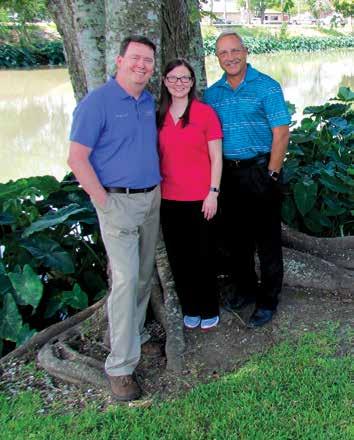
10 minute read
Bishop’s Holy Week schedule
Announcements
Bishop Shelton J. Fabre’s Holy Week schedule
Palm Sunday Sunday, March 28 Good Shepherd Chapel, diocesan Pastoral Center 9 a.m.
Holy Thursday Thursday, April 1, Chrism Mass Cathedral of St Francis de Sales, Houma 10:30 a.m.
Holy Thursday Thursday, April 1, Mass of the Lord’s Supper Cathedral of St Francis de Sales, Houma 7 p.m. Good Friday Friday, April 2, Passion and veneration St Joseph Co-Cathedral, Thibodaux 3 p.m.
Easter Vigil Saturday, April 3, St Joseph Co-Cathedral, Thibodaux 8 p.m.
Easter Sunday Sunday, April 4, Good Shepherd Chapel, diocesan Pastoral Center 9 a.m.
All liturgies will be livestreamed. Visit htdiocese.org/ holyweek to watch these liturgies.
Life is great~ Get busy living.
Independent Living Community
1201 Cardinal Drive ~ Thibodaux, LA 70301 (985) 446-9050 ~ www.stjosephmanor.org For More Information Contact: Natalie Barbera natalieb@stjosephmanor.org
Craig Pate, PT • Lori Matherne, DPT • Craig Hebert, PT
For all your physical therapy needs, choose our experienced professionals who will become your trusted friends.
Announcement
Catholic Charities opens Caritas Food Pantry in East Houma
Story by Janet Marcel Photos by Lawrence Chatagnier
Catholic Charities Diocese of Houma-Thibodaux’s Caritas Food Pantry, East Houma opened its doors to the public recently. The Food Pantry is located at 131 Rosary St. in the old school building next to Our Lady of the Most Holy Rosary Church in Houma. Twenty-five households consisting of a total of 76 individuals were served on the first day. Recipients are screened and eligibility is incomebased.
We are excited to be able to expand our feeding ministries to East Houma,” says Nicole M. Bourgeois, Ph.D., LMFT, executive director of Catholic Charities. “The people of Our Lady of the Most Holy Rosary Church parish and the Knights of Columbus Our Lady of the Most Holy Rosary Council 16362 have been extremely helpful through physical donations and time in helping us convert two classrooms into the food pantry. We are excited to bring this crucial ministry to East Houma in an effort to better serve people throughout the community.”
Initial donations were received from the T-Caillou Lion’s Club, Houma Elks, Bayou Community Foundation, and through #iGiveCatholic. The Food Pantry is affiliated with the United States Department of Agriculture (USDA) and Second Harvest Food Bank of New Orleans.
Initially, the Caritas Food Pantry will be serving clients on the second and fourth Wednesday of the month by appointment. Those in need can call (985) 746-5280 Monday through Friday from 8:30 a.m. to 4:30 p.m. to be screened and schedule their appointment for the day of the distribution. BC
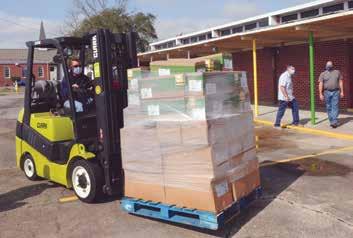
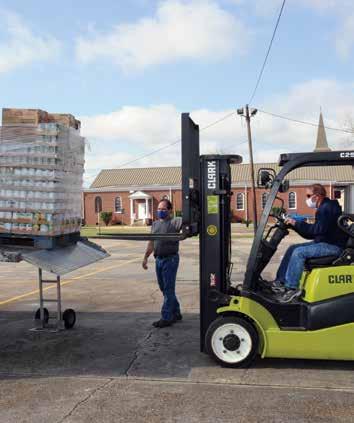
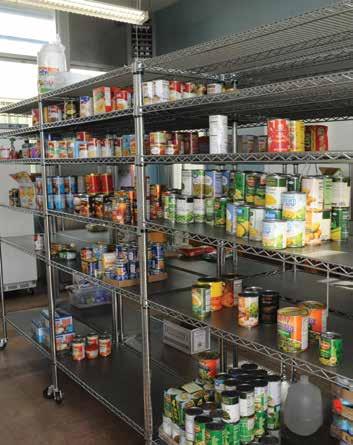
Announcement

LAWRENCE CHATAGNIER/BAYOU CATHOLIC
COVID-19 vaccines arrive
Father Mike Bergeron receives the COVID-19 vaccine at the Homestead Assisted Living facility in Houma where he regularly celebrates Mass with the residents. Walgreens Pharmacy administered 80 vaccines to the staff and residents of the facility on that day. Looking on is B.J. Jennings, administrator of the Homestead.

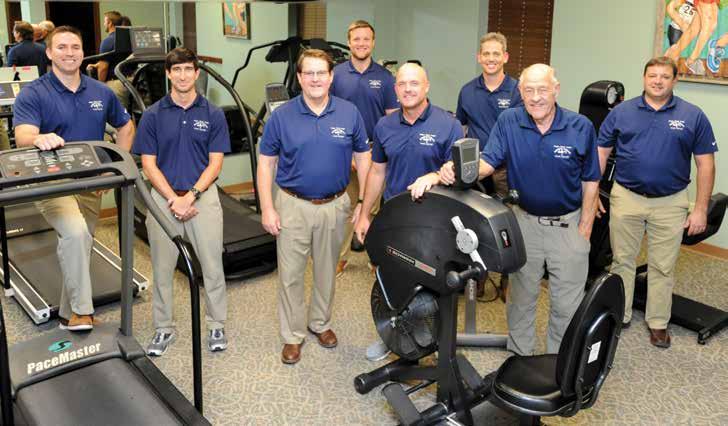
MedIcare certIFIed preFerred provIder NetWork
phySIcIaN reFerral Not requIred • Back/Neck care • Work/SportS INjurIeS • orthopedIc MaNual therapy • Foot orthotIcS/Foot care • WellNeSS prograMS • pre-eMployMeNt teStINg • FuNctIoNal capacIty evaluatIoN (Fce) • trIgger poINt dry NeedlINg • certIFIed haNd therapy
985.447.3164
808 Bayou Lane, ThiBodaux
985.876.1155
1321 Grand CaiLLou, houma
985.223.4760
125 Bayou Gardens, houma
www.ptcenter-la.com
Vatican
Vatican: Institutionalization of elderly a mark of ‘throwaway culture’
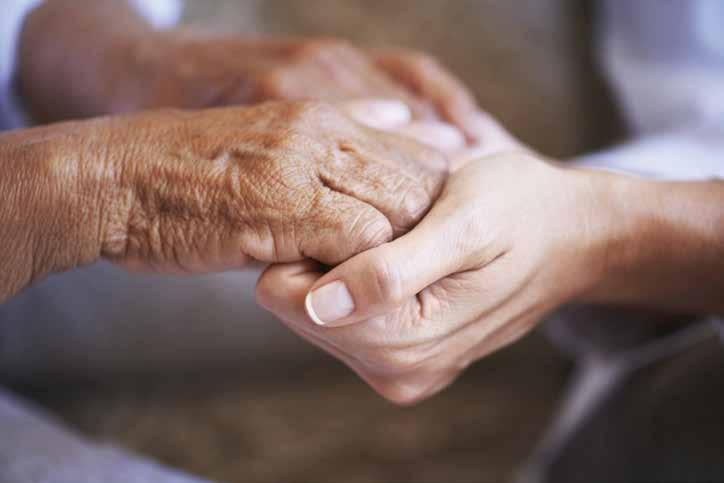
By COURTNEY MARES
Vatican City, (CNA) The Vatican called for a rethinking of elder care in a document arguing that the elderly are best cared for in an environment more like a family home than a hospital.
The Pontifical Academy for Life published the 6,000word document Feb. 9 on the need to improve social and pastoral care for the elderly, particularly after the devastating effect of the coronavirus pandemic on retirement homes across the world.
“During the first wave of the pandemic, a considerable part of the deaths from COVID-19 occurred in institutions for the elderly, places that should have protected the ‘most fragile part of society’ and where instead death has struck disproportionately more than in the home and family environment,” the document said.
The pontifical academy called for a “profound change of mentality and approach” to care for the elderly, pointing to the disproportionate number of coronavirus-related deaths as an example of a failure of the widespread “institutionalization of the elderly” and calling it a manifestation of “throwaway culture.”
“The institutionalization of the elderly, especially of those most vulnerable and most alone, proposed as the only possible solution to look after them, in many social contexts manifests a lack of concern and sensitivity towards the weak, for whom it would rather be necessary to use means and financing to guarantee the best possible care to those who need it most, in a more familiar environment. Isolating the elderly is an obvious manifestation of what Pope Francis has called the ‘throwaway culture,’” it said.
The pontifical academy highlighted the family home as the best environment to respect the “full dignity of the elderly,” whose lives are often marked by suffering.
“Already in the years when he was Archbishop of Buenos Aires, Pope Francis stressed that ‘the elimination of the elderly from the life of the family and of society represents a
Vatican

the expression of a perverse process in which there is no longer any gratuitousness, generosity, that wealth of feelings that make life not just a give and take, that is a market … Eliminating the elderly is a curse that our society often inflicts on itself,’” the document said, quoting a 2013 statement from Cardinal Jorge Mario Bergoglio before he became pope.
The document also acknowledged that there are many people who lack the support of the ideal family environment and therefore it called for another framework connecting different generations.
“Nursing homes should be redeveloped … i.e. offer some of their services directly in the homes of the elderly: Hospitalization at home, taking care of the single person with low- or high-intensity assistance responses based on personal needs, where integrated social and health care and home care services are the pivot of a new and modern paradigm,” it said.
The document also called for changes to cities to make them more habitable for the elderly.
It said: “The data tell us that the elderly population is growing faster in urban areas than in rural areas and that the concentration of older people in them is higher … According to data from the World Health Organization, in 2050 there will be two billion over-60s in the world: therefore, one in five people will be elderly. It is therefore essential to make our cities inclusive and welcoming places for the elderly and, in general, for all forms of fragility.”
The Pontifical Academy for Life asked dioceses, parishes and religious communities to reflect more attentively on pastoral care for the elderly.
“The aging man is not approaching the end, but the mystery of eternity; to understand it he needs to get close to God and to live in relationship with him. Taking care of the spirituality of the elderly, of their need for intimacy with Christ and sharing of faith is a task of charity in the church,” it said.
The document quoted St. John Paul II’s 1999 “Letter to the Elderly”: “It is urgent to recover the right perspective from which to consider life as a whole. And the right perspective is eternity, for which life is a significant preparation in every phase. Old age also has its role to play in this process of progressive maturation of the human being on his way to eternity. If life is a pilgrimage toward the mystery of God, old age is the time in which we most naturally look at the threshold of this mystery.”
Pope Francis recently proclaimed the World Day of Grandparents and the Elderly, to take place each year in July.
Archbishop Vincenzo Paglia, the president of the Pontifical Academy for Life, said that the pope’s institution of the new annual day in the church was “an invitation to believers to grow in them and around them a new sensitivity and care toward grandparents and the elderly.”
“It is the church’s responsibility,” Paglia said at a Vatican press conference on Feb. 9.
“We owe it to our elders, to all those who will become so in the years to come. The level of civilization of an era ... is measured by the way we treat those who are weaker and more fragile.” BC

Catholic Charities of the Diocese of Houma-Thibodaux
Dr. Nicole Bourgeois, LMFT nbourgeois@htdiocese.org 985-876-0490


Announcement
Retrouvaille weekend experience scheduled for March 5-7 in Baton Rouge
A Retrouvaille weekend experience is scheduled for Friday, March 5 through Sunday, March 7. Retrouvaille (pronounced retro-vi with a long i), a ministry of help that offers the tools needed for couples seeking to heal and renew their marriages and rediscover a loving marital relationship, is a threephase program consisting of a weekend experience, a series of six post-weekend sessions over 12 weeks, followed by monthly small-group support meetings.
Retrouvaille has helped tens of thousands of couples at all stages of disillusionment or misery in their marriage, and the program can help you, too.
For confidential information or to register for the upcoming program beginning with a weekend on March 5-7, call (985) 232-5963 or email: retrovibrcomcoor@gmail.com or visit www.HelpOurMarriage.com. BC
Bayou Catholic Outreach Line
In response to the Charter for the Protection of Children and Young People from the United States Conference of Catholic Bishops the Diocese of Houma-Thibodaux is offering an Outreach Line (formerly known as the Child Protection Contact Line). The Outreach Line is an effort to continue the diocesan commitment to support healing for people who have been hurt or sexually abused recently or in the past by clergy, religious or other employees of the Diocese of Houma-Thibodaux.
The Diocese of Houma-Thibodaux Outreach Line operates from 8:30 a.m. to 4:30 p.m. Monday through Friday. A trained mental health professional responds to the line. Individuals are offered additional assistance if requested. The Diocese of Houma-Thibodaux Outreach Line Telephone number is (985) 873-0026 or (985) 850-3172
Línea de Comunicación Diocesana
Con el fin de cumplir con las Políticas de Protección de Niños y Jóvenes de la Conferencia de Obispos Católicos de Los Estados Unidos, la Diócesis de Houma-Thibodaux ofrece una Línea de Comunicación (antes Línea de Contacto para la Protección de los Niños). La Línea de Comunicación es parte del esfuerzo diocesano de comprometerse con el mejoramiento de aquéllos que han sido lastimados o abusados sexualmente recientemente o en el pasado por miembros del clero, religiosos u otros empleados de la Diócesis de Houma-Thibodaux.
El horario de la Línea de Comunicación de la Diócesis de Houma-Thibodaux es de 8:30 a.m. a 4:30 p.m., de lunes a viernes. El encargado de esta línea es un profesional capacitado en salud mental. Se ofrece asistencia adicional al ser solicitada.
Línea de Comunicación de la Diócesis de Houma-Thibodaux Número de teléfono (985) 873-0026 o (985) 850-3172
Ñöôøng daây ñieän thoaïi Cöùu giuùp Giaùo phaän
Ñeå höôûng öùng Hieán chöông Baûo veä Treû em vaø Giôùi treû töø Hoäi ñoàng Giaùm muïc Hoa kyø, Giaùo phaän Houma-Thibodaux ñang chuaån bò ñöôøng daây ñieän thoaïi Cöùu giuùp (luùc tröôùc laø ñöôøng daây lieân laïc baûo veä treû em). Ñöôøng daây ñieän thoaïi Cöùu giuùp laø moät söï coá gaéng cuûa giaùo phaän nhaèm cam keát haøn gaén naâng ñôõ nhöõng ai ñaõ bò toån thöông hoaëc bò laïm duïng tính duïc hoaëc gaàn ñaây hoaëc trong quaù khöù bôûi giaùo só, tu só hoaëc caùc coâng nhaân vieân cuûa Giaùo phaän Houma-Thibodaux.
Ñöôøng daây ñieän thoaïi Cöùu giuùp Giaùo phaän hoaït ñoäng töø 8:30 saùng ñeán 4:30 chieàu, thöù hai ñeán thöù saùu. Moät nhaân vieân chuyeân nghieäp veà söùc khoûe taâm thaàn traû lôøi treân ñöôøng daây ñieän thoaïi. Nhöõng caù nhaân seõ ñöôïc trôï giuùp naâng ñôõ theâm neáu caàn.










